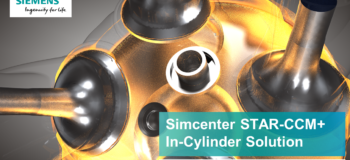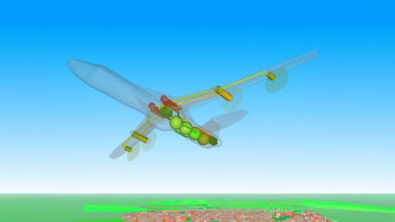Cloud computing and CFD – The more you core, the less it’s a chore

This is as much a story of cloud computing in CFD as it’s about selling a house.
If you have ever sold a house, you know about the need to use resources wisely. My family and I just decided to move out to the countryside and we are learning the lesson all over again. Realizing the perfect time to sell our current house is NOW, suddenly we must paint here and there, clean floors, add a missing windowsill, remove weeds… Right now, there’s a list of 40+ items to do! In the coming week! Panic! I need to parallelize the tasks: Lazy teenager – paint the garage doors! Kid #2 remove weeds! Dear friends, please come and help us on Saturday, we will pay you back! Having 6-8 people working at the same time will speed things up significantly.
As a Product Manager, I see this situation often in the world of engineering and product design. The next generation design must be defined in a week! Panic! To take the right engineering decisions, you need computational fluid dynamics (CFD) simulation results in hours!
In 2020, that just means you need cloud computing for your CFD. By utilizing massive parallelization, you can achieve this without compromising accuracy. By running your simulations on the cloud, you can scale up very quickly, just when you need it, and flexible licensing schemes makes the process affordable too. Luckily, Simcenter STAR-CCM+ provides you with all this, enabling you to effectively cut down time to results.
Just ask TLG Aerospace who saved 75% of their CFD cost by switching to Simcenter STAR-CCM+ to generate aerodynamic databases for aircraft certification. By running simulations remotely on Amazon Web Services, they get the compute resources they need when they need them, and through flexible licensing they only pay for what they need, enabling them to freely swap between last minute panic and calmer times.

When using Simcenter STAR-CCM+, you can quickly scale up your simulations when needed through running your simulations on the cloud through any of Siemens’ partners, or on a local cluster. The flexible licensing scheme allows you to scale up and down in a cost-effective manner. If you typically run large simulations on your local cluster, the Power Session allows you to run your simulations on unlimited core counts. If your demand varies a lot during the year, you benefit from Power on Demand, where you pay for unlimited core counts only when you need it, and Power Tokens offers ultimate flexibility for design exploration.
Truly utilizing cloud computing and clusters to get results quickly is only possible if the software scales very well on many cores. Simcenter STAR-CCM+ offers scalability from meshing through solve to postprocessing:
Meshing: The polyhedral and hexahedral (trimmed) meshers are fully parallelized, enabling you to create high quality meshes in a matter of minutes! The chart below shows meshing scalability for external aerodynamics simulations of two car geometries. A polyhedral + a trimmed mesh was created for each car geometry, based on the same surface mesh and settings, using suitable prism layer settings for drag prediction. As you can see, you can create a high-quality mesh for external aerodynamics in just a few minutes.
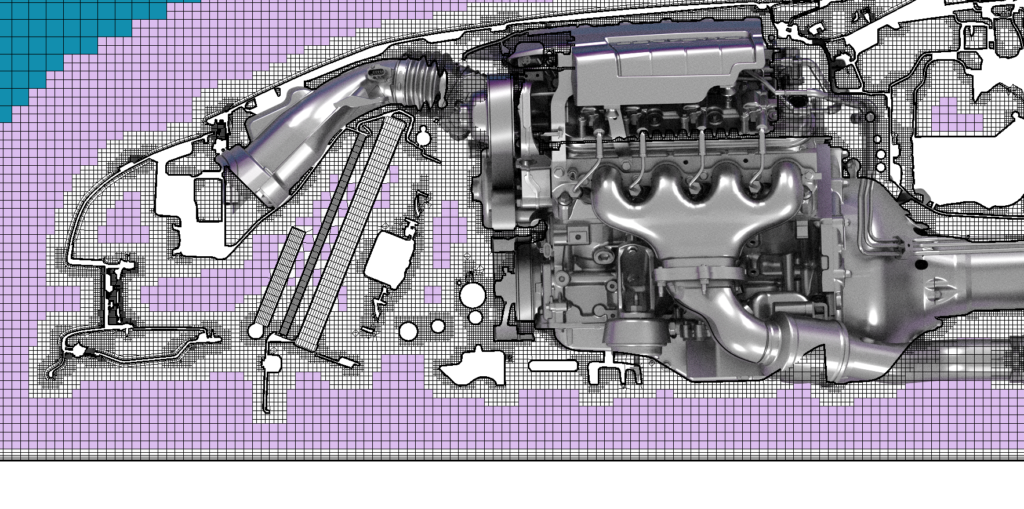
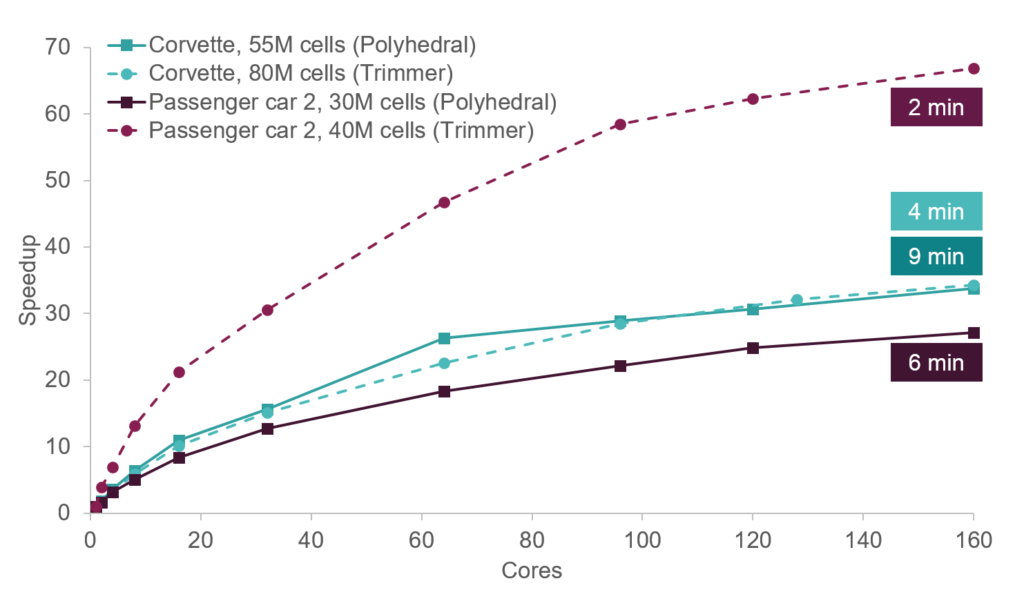
Simulation: The Simcenter STAR-CCM+ flow solvers are designed with scalability in mind, allowing you to run high complexity cases in a fraction of the serial time.
See the example below where drag calculations for a passenger car is shown to scale well, offering a speedup of 4.5x when increasing the core count by 6x from 448 to 2,688. This is a 100 Million cells DES simulation including the underhood and modeling tyre rotation using moving reference frame.
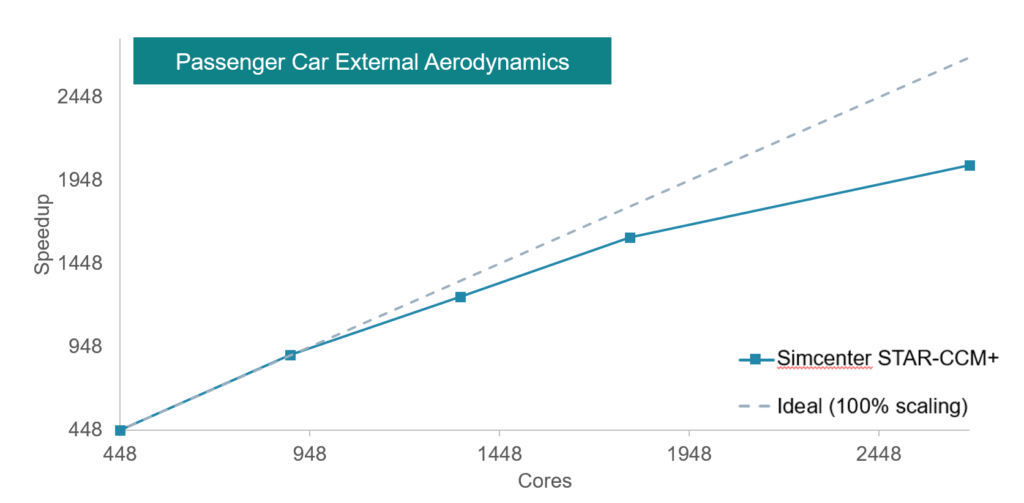
Even with complex physics enabled, such as combustion, very high scalability can be reached. In the chart below, a gas turbine combustor is shown to run 41 times faster when scaling from 450 cores to 17,300 cores! The Flamelet Generated Manifold combustion model is used in an LES setup on 692 Million cells.
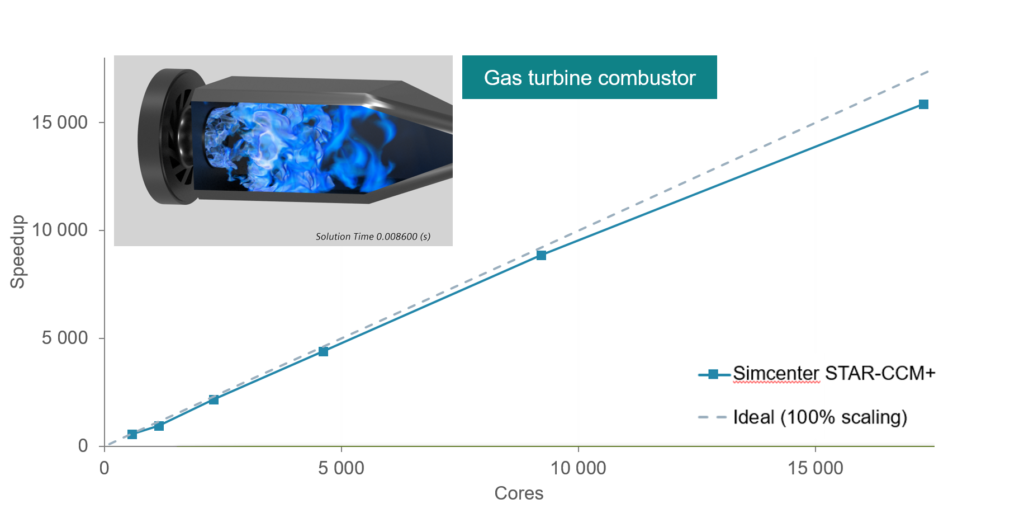
Post processing: Finally, impactful images and animations such as the video below are also computationally demanding. To quickly get the images required to communicate simulation results, Simcenter STAR-CCM+ allows you to choose a dedicated machine with powerful graphics card to do the rendering. On top of that, you don’t even have to identify the best machine yourself, the Graphics Checker can do that for you! A graphics card on your local machine? CPU’s on your cluster? A dedicated machine with powerful graphics card? It doesn’t matter, Simcenter STAR-CCM+ identifies the best resource for you and renders the images there. Just like when you ask your friend to help and she decides to polish the windows since she is so amazingly good at it (I never had such clean windows before!).
On top of that, for CPU based rendering, you can create images many times faster through multi-threading. See the picture and chart below for an example, where the velocity magnitude around the rearward mirrors is visualized through fluid streamlines and the pressure is visualized on the windows. This picture is rendered 5x faster on a 16-core node!

All in all, parallel scalability, flexible licensing and cloud computing make it possible for you to get the CFD results you need, when you need them. Perhaps this is why Parallelization was identified as a core strength of Simcenter STAR-CCM+ in a recent user survey by Resolved Analytics.
So, just like when I rally my kids and my friends to get the house in order to sell it, you can rally the Cloud and Simcenter STAR-CCM+ to get the results in hours, not weeks. What will you do with the time you save? Perhaps explore the design space to deliver truly innovative solutions to management? Or add more physics or geometrical details for a more accurate answer? You decide!
I just wish I could parallelize my housework on 10,000 cores…!
